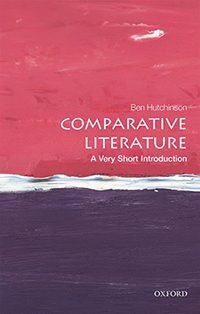Ben Hutchinson, Professor of European Literature in the Department of Modern Languages, has published a new book entitled Comparative Literature: A Very Short Introduction (Oxford University Press, 2018).
Comparative Literature is both the past and the future of literary studies. Its history is intimately linked to the political upheavals of modernity: from colonial empire-building in the nineteenth century, via the Jewish diaspora of the twentieth century, to the postcolonial culture wars of the twenty-first century, attempts at ‘comparison’ have defined the international agenda of literature. But what is comparative literature? Ambitious readers looking to stretch themselves are usually intrigued by the concept, but uncertain of its implications. And rightly so, in many ways: even the professionals cannot agree on a single term, calling it comparative in English, compared in French, and comparing in German. The very term itself, when approached comparatively, opens up a Pandora’s box of cultural differences.
Yet this, in a nutshell, is the whole point of comparative literature. To look at literature comparatively is to realise just how much can be learned by looking over the horizon of one’s own culture; it is to discover not only more about other literatures, but also about one’s own; and it is to participate in the great utopian dream of understanding the way nations and languages interact. In an age that is paradoxically defined by migration and border crossing on the one hand, and by a retreat into monolingualism and monoculturalism on the other, the cross-cultural agenda of comparative literature has become increasingly central to the future of the Humanities. We are all, in fact, comparatists, constantly making connections across languages, cultures, and genres as we read. The question is whether we realise it.
This Very Short Introduction tells the story of Comparative Literature as an agent of international relations, from the point of view both of scholarship and of cultural history more generally. Outlining the complex history and competing theories of comparative literature, Ben Hutchinson offers an accessible means of entry into a notoriously slippery subject, and shows how comparative literature can be like a Rorschach test, where people see in it what they want to see. Ultimately, Hutchinson places comparative literature at the very heart of literary criticism, for as George Steiner once noted, ‘to read is to compare’.
The book is part of Oxford University Press’s Very Short Introductions series, which has sold over nine million copies worldwide.

